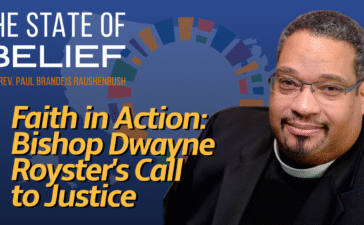(RNS) — A meme, as Kyle Hide explains it, is like a gene for culture. A concept first coined by biologist Richard Dawkins, it’s a unit of meaning that evolves and spreads through imitation.
“ A meme functions similarly to a virus,” said Hide, the 34-year-old administrator of the popular Instagram account I Need God in Every Moment of My Life, a self-described culturally non-practicing Catholic and lifelong internet obsessive. “That’s why we might call something online viral. You could think of memes as anything that culturally transmits itself and replicates through culture.”
I Need God in Every Moment of My Life reads like a digital confessional booth filtered through Tumblr-core aesthetics, Catholic iconography and internet absurdism. Posts range from blurry screenshots of tweets about prayer and heartbreak to ironic riffs on spiritual longing.
For Hide, who is known online and on his podcast “I Need God Pod” as “God-lover Kyle,” memes are more than just content striving for virality; they are a form of meaning-making. Posting under the persona allows Hide, who lives in Brooklyn, New York, to maintain both intimacy and distance from followers, he said.
He and three queer friends from different Christian backgrounds turned their God-focused group chat into the Instagram account in 2020.
“We all loved God, and we were like, we need God,” Hide said. “Everything is too godless. We thought that God is coming back in a major way. Let’s just create a page and we’ll all post to it.”

A variety of “I Need God in Every Moment of My Life” Instagram posts. (Screen grab)
Hide, who now solely manages the account and interacts with its 138,000 followers, said of the page’s fallen collaborators, “I think they weren’t true posters maybe in their hearts as much as I am.”
One image, which has 84,000 likes, shows an early-2000s-style 3D-rendered blonde woman wagging her finger while holding a large cigarette. The image’s original text, “DON’T EVEN THINK ABOUT IT GIRL,” is obscured and replaced by the phrase, “DESIRE IS THE ROOT OF ALL SUFFERING,” a nod to Buddhist philosophy on attachment and suffering. One video shows someone filming inside their home filled with an eerie, glowing mist. The overlaid text reads, “Did I burn chicken or summon the Holy Spirit?” At the end, a hand reaches out into the haze, as if trying to touch the divine smoke.
Hide collects, curates and re-posts thousands of images. The page presents like a collage of spiritual yearning where irony and sincerity blur, allowing followers to both laugh at and engage with spirituality without being told how to interpret it. Absurdity gives shape to something that feels like devotion, and the page attracts those with complicated relationships to faith.
“It has attracted queer people for sure,” Hide said. “LGBT, gay people, people who were raised religious but felt ostracized or excluded from fully identifying with it.”
Other fans, he said, include those with experience in 12-step recovery programs, where belief in a higher power is central. “You need to think that there is something above you that you have to submit to,” he said. “That kind of person definitely likes the page.”

Kyle Hide in Brooklyn, New York, on Feb. 22, 2025. (Photo by Fiona Murphy)
For those on the fringes of religion, Hide said he believes the page’s tone makes spirituality feel more accessible and not as rigid, including for the newly converted. He and his page’s fans are not particularly interested in orthodoxy. But, the page has a real impact on the lives of some followers, he noted.
One woman, Hide said, reached out to him explaining she was a recovering alcoholic who recently converted to Catholicism. She said after years of following I Need God in Every Moment of My Life, she was “worn down to think religiously.”
“It can be a gateway to accepting those things that are hard to accept,” Hide said, adding that for some, the page serves as a bridge between skepticism and faith. “If that (a conversion) happened, that’s enough to show me that there is something happening here. And what is happening you could call the Holy Spirit at work, you know what I mean?”
Raised Catholic in northeast Pennsylvania by a quiet mother who urged him toward music lessons and summer camp, Hide said he struggled with social interactions but gravitated toward performance. A babysitter introduced him to AOL via dial-up internet, and it quickly became his refuge. AOL chatrooms and sites like Neopets, LiveJournal and Tumblr were transformative spaces for the young, queer and existentially curious boy.
“ If you’re a shy person, then you gravitate towards online spaces,” Hide said. “You’re not physically present, so you can be whoever you want.”
He describes his online self as both a shadow and an aspiration. “It’s me, but also who I want to be,” he said.
In high school, Hide was a practicing Catholic going to church weekly but maintained a broader curiosity. When he was 16 years old, he posted a MySpace bulletin titled “God?” asking, “Can you send me your opinion of him in a message, please?”
“I had existential questions from a super young age, and I think that naturally led to wondering about God, the mystery of life and why we’re here,” Hide said. “I’m a Leo, but my Leo placements are in my ninth house, which is the house of philosophy.”
Hide is no longer a regular churchgoer. “I’m not practicing, but I identify as Catholic,” he said. He prays sometimes and worries about his soul — not in a salvation sense, but in terms of quality.
“Your soul, like your body, needs maintenance,” he said.
Hide considers I Need God more than a brand or a business, but a spiritual routine. He has added a merchandise store, beginning with a simple sweatshirt that reads “God loves me and there’s nothing I can do about it,” which sold very well, he said. Soon after, he launched the podcast with the intention of expanding the project offline.

“I Need God Pod” episode art with guest Dan Hentschel. (Courtesy image)
His podcast has featured guests from diverse spiritual backgrounds, including Orthodox Catholic actress Dasha Nekrasova, Catholic school graduate and satirist Dan Hentschel, Muslim meme artist Djinn Kazama, a money witch, a Mormon atheist and more.
“I’m more interested in what people believe than whether it’s correct,” he said.
Now, Hide is looking to organize in-person events, like rosary-making or candle workshops. He said he would like to belong to a parish, too, possibly participating in music ministry, but admits self-discipline hinders him. Wanting to create that in-person element for I Need God, he said, “I just feel like there’s only so much fulfillment I can get from posting.”
Hide is also aware of Instagram’s fragility as algorithms shift, platforms disappear and styles change. Still, he remains devoted to the act of posting.
“The screen is a mental space,” he said. “It becomes part of you. … The internet itself has a godly orientation or a godly presence in our lives. The power of it is so big and beyond us, that it sort of starts to function in a God-like way.”
This article was produced as part of the RNS/Interfaith America Religion Journalism Fellowship.






